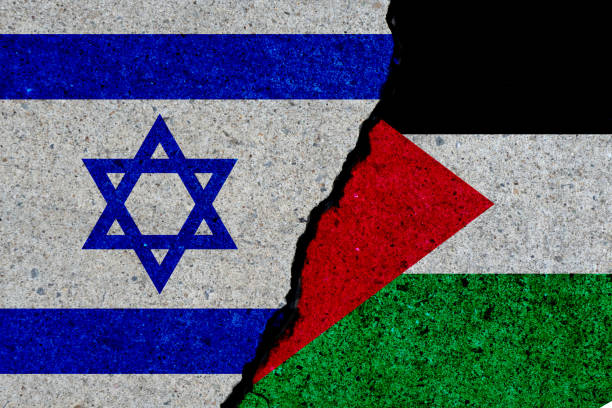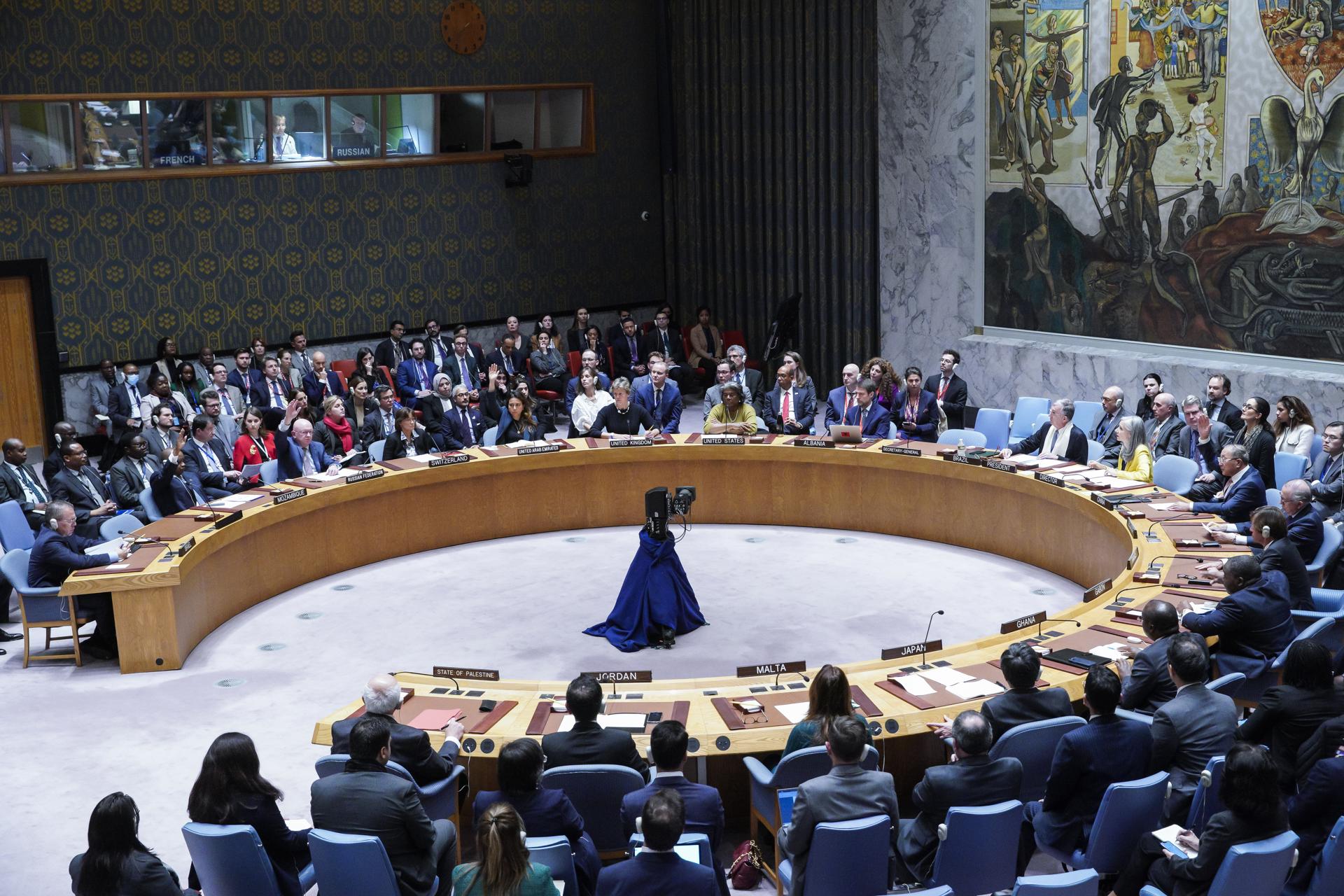The world over, all eyes are on the United Nations to bring an end to the conflict between Israel and Palestine, at least diplomatically, once and for all. Rightfully so, considering the core objective of the multilateral organisation, but the decades old Israel-Palestine conflict has defied every attempt towards lasting peace. Does the UN Security Council have the potency to end this conflict? Daily Trust on Sunday spotlights the issues.
In the aftermath of World War II, the first test of the UN’s fundamental objective is perhaps the intervention in the Arab Israeli tension in 1947 which failed.
It was two years after its creation in 1945, that the United Nations first intervened in the Jews-Palestine conflict by adopting resolution 181, known as the Partition Plan, which sought to divide the British Mandate of Palestine into Arab and Jewish states to accommodate the new state of Israel.
Although the resolution which will later be known as the two-state solution was rejected by Palestine, it was passed with 33 votes in favour, 13 against, and 10 abstentions at the UN general assembly.
But the jurisdiction of the UN to partition Palestine was itself a subject of contestation, in addition to the limited powers of the UN general assembly to make binding resolutions.
Under the partitioning plan, the Jews which constituted 32 per cent of the population were allocated 55.5 per cent of the land, with control over coastlines, agricultural lands and seaports.
For the Palestinians, the UN partitioning was a deal breaker, favouring more of the state of Israel.
While the Jews claim ancestral ownership to the land, preceding the 19th century, Palestine view the creation of the state of Israel as a violation of their rights for self determination.
This laid the foundation for the Israeli-Palestine conflict that has lasted 75 years, with US and Egypt leading peace talks at different times.
From the UN resolution 242 in 1967, Camp David Accords in 2000, Oslo Accords I & II Accords, to the Abraham Accords in 2020, several peace treaties have failed to bring lasting peace to the region.

Geostrategic Interest of UN Security Council Permanent Members Standing in the way of Peace – Expert
Chapter VII of the United Nations Charter sets out the UN Security Council’s powers to maintain peace. It allows the Council to “determine the existence of any threat to the peace, breach of the peace, or act of aggression” and to take military and nonmilitary action to “restore international peace and security.”
Experts say the UNSC as currently fashioned lacks the inclusivity to function as a body representing global interest.
Former Nigeria’s ambassador to Singapore Ogbole Amedu-Ode, speaking to Sunday Trust says the ability of the UNSC to bring an end to the Israel-Palestine war “is saddled with a caveat; the geo-strategic interests of the five permanent members of the UN Security Council (UNSC) – China, France, Russia, UK and US – who wield veto power. That is the power to veto any substantive resolution.”
“In reality therefore, the UN is hard put to deliver lasting peace in the Arab/Israeli conflict. Except, however, there is a consensus of approach by all the five permanent members of the UNSC,” Ogbole added.
Consisting of 15 member states, the UNSC has 5 permanent members (Russia, China, US, UK, France) with powers to veto resolutions and 10 non-permanent members.
For any resolution to be adopted, nine of the fifteen members must vote in favour, with no objection from any of the five permanent members except where they abstain.
In the most recent demonstration of this power, two resolutions for Ceasefire and Humanitarian pause in the Israeli-Palestine war, proposed by Russia and Brazil failed.
The Security Council failed to adopt a resolution put forth by the Russian Federation that would have called for an immediate humanitarian ceasefire in the ongoing Israel-Palestine crisis.
While the draft resolution received support from one other permanent Council Member – China – and three non-permanent members, including Gabon, Mozambique and the United Arab Emirates, the delegations of France, Japan, the United States, and the United Kingdom voted against it, and the remaining six Council members abstained from voting.
US representative at the UNSC says the proposed resolution falls short by failing to mention Hamas. Council members cannot allow the Council to shift the blame to Israel, she said, adding that her delegation could not vote for a resolution that dishonours victims.
Israel’s delegate stressed that his country needs to obliterate Hamas for its own self-preservation, saying the resolution did not ask Hamas to put down its arms. The Israeli representative said before any calls for aid or calm, Hamas should be designated a murderous terror organization.
Riyad H. Mansour, Permanent Observer for the State of Palestine, calling for an end to the attacks on Palestine, said that the 3,000 Palestinians killed so far in recent days are overwhelmingly civilian, more than half being women and children.
Following this, the Security Council also failed to adopt a resolution put forth by Brazil that would have called for humanitarian pauses to allow full, safe and unhindered access for United Nations agencies and their partners, due to a veto cast by a permanent member of the Council, the United States.
Although, the United States cast a veto, the draft resolution garnered support from 12 Council members, including two permanent members (China, France), with two other permanent members (United Kingdom, Russian Federation) abstaining.
The delegate of the United States, referring to the visit of the US President Joe Biden to the region, said the Council needs to let the hard work of diplomacy undertaken by her country “play out”. She also expressed disappointment that the draft did not mention Israel’s right to self-defence.
Meanwhile, the US President during his visit to Israel announced an agreement reached to allow aid entry to Gaza through Egypt border.
This raises question of whether there would ever be a consensus on the Israel Palestine war at the UNSC.
UN Resolution 242
Observers also blame the geostrategic politics of interest at the UNSC for the non-enforcement of the resolution 242 which calls for the withdrawal of Israeli troops from the occupied territories, acknowledge the claim of sovereignty, territorial integrity, and political independence of every state in the region; a violation that should be treated as a violation of international law.
In its defence, Israel says it withdrew its troops from Gaza since 2005 but many Palestinians consider the continued blockade of its land, air and sea borders as an affront on its sovereignty, which violates the UN resolution.
Critics of Israel have pointed to the expansion of Israeli settlements, demolition of Palestinian structures, daily violence and continued inflammatory rhetoric by Israeli government representatives as acts that have continued to fuel resentment between Israelis and Palestinians.
Tor Wennesland, United Nations Special Coordinator for the Middle East Peace Process, speaking via videoconference, reported ongoing settlement activity by Israeli authorities who advanced plans for 6,300 housing units in Area C, and approximately 3,580 housing units in East Jerusalem.
Repercussions for Violating International Law
On the repercussions for violating international law, the former ambassador Ogbole Ode, said “with regards to the invasion of a sovereign country by a UN member state, the Security Council of the United Nations (UNSC) is the organ empowered by the UN Treaty to enforce, broadly, international law.”
“This can be achieved through sanctions, peace-keeping operations, or formal censures. While censures have no direct, negative impact, they serve as a symbol of the potential reputational harm that comes with violating international law.”
“However, when the Security Council imposes sanctions or organises peace-keeping operations, it can have significant impacts given that all of the permanent members of the Security Council will generally engage supportively, and all member-states will have to at least appear to abide by them.” “However, the permanent members of the Security Council often stand in the way of action being taken against them or their close allies, so alternative mechanisms exist for resolving disputes.”
The United States for instance, which has unequivocally expressed its support for Israel has vetoed dozens of United Nations Security Council (UNSC) resolutions critical of Israel, including at least 53 since 1972, according to UN data.
Ogbole Ode explains that though “Under General Assembly Resolution 377(uniting for peace), the General Assembly can act when the Security Council has failed… “these actions will be non-binding. Generally, this has been used to circumvent opposition from veto powers, such as its uses to initiate the United Nations intervention in the Korean War and to address Israel’s actions in the disputed territories it controls.”
Uniting for Peace has been implemented 11 or 13 times since the adoption of General Assembly resolution 377 (V) on 3 November 1950, failing in the recent Russia-Ukraine war and the ongoing Israel-Palestine war.
Two-state solution still on the table?
The two-state solution has for long been proposed as a panacea for lasting peace between Israel and Palestine, but with the waning support for the proposal, there appears to be a long way for lasting peace in the region.
Ogbole stated that “A 2021 survey by experts found that 52 per cent believe that the two-state solution is no longer achievable. 77 percent believe that if not achieved, the result would be a one-state reality akin to apartheid. According to a 2021 Palestinian Centre for Policy and Survey Research (PCPSR) poll, support for a two-state solution among Palestinians and Israeli Jews, as of 2021, has declined to 43 and 42 percent, respectively.”
Similarly, “According to some Middle East experts, the majority of Palestinians say they want to reclaim all of historic Palestine, including pre-1967 Israel. A one-state solution with equal rights for Arabs and Jews is ranked second.”
Despite these options, none is on the table now. While Hamas says it is fighting to resist occupation, Israel says it will do whatever it takes to defend itself from attack, with innocent civilians caught in the middle.




